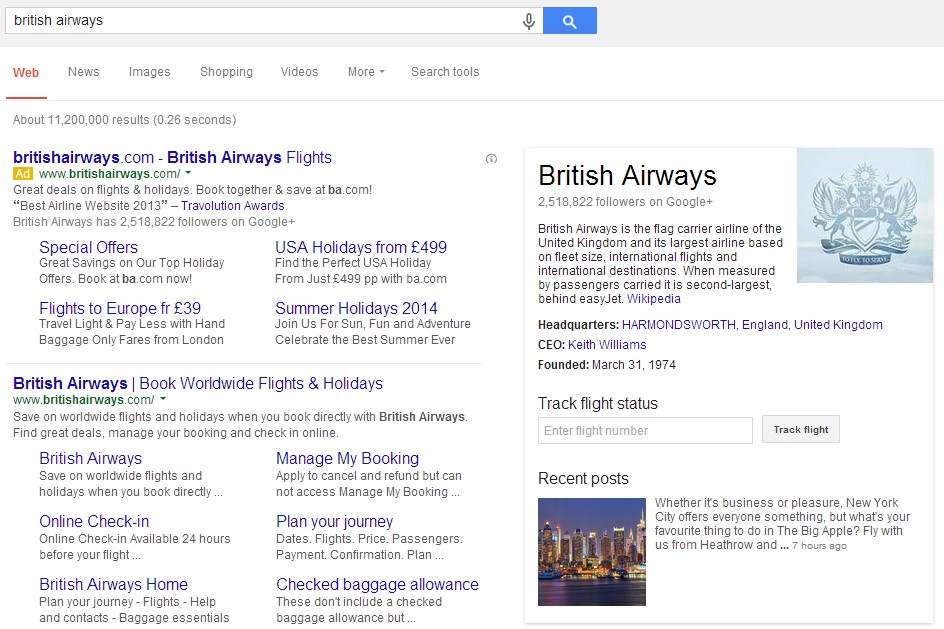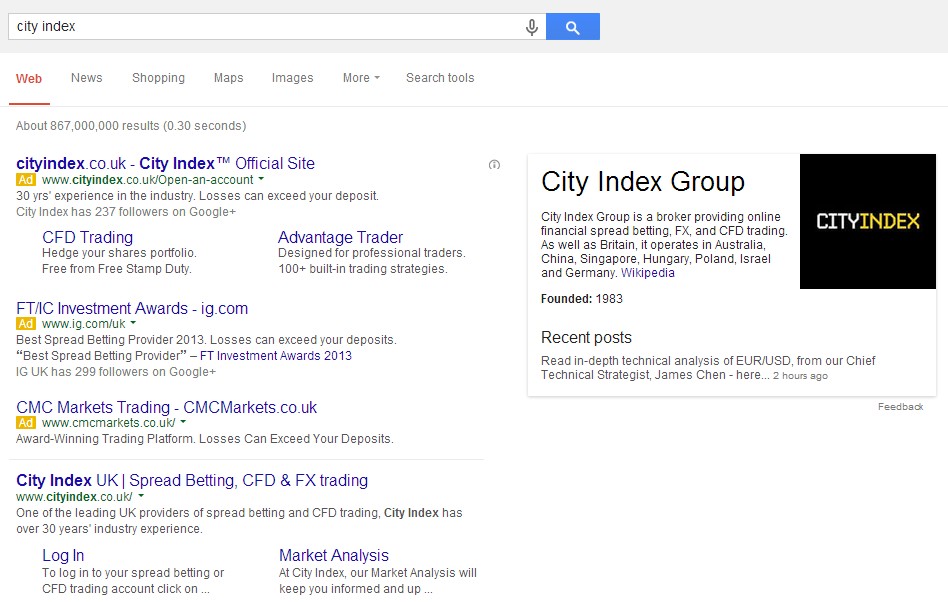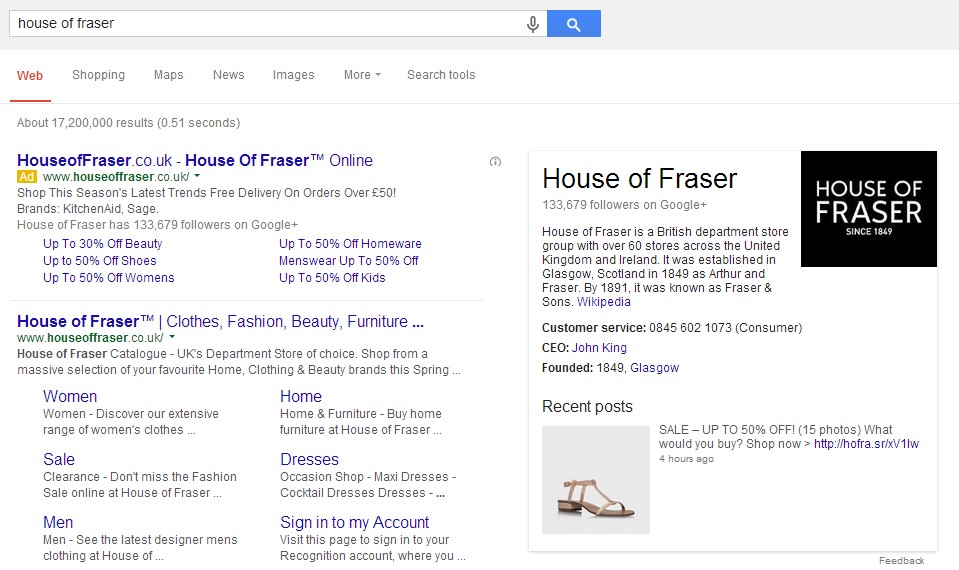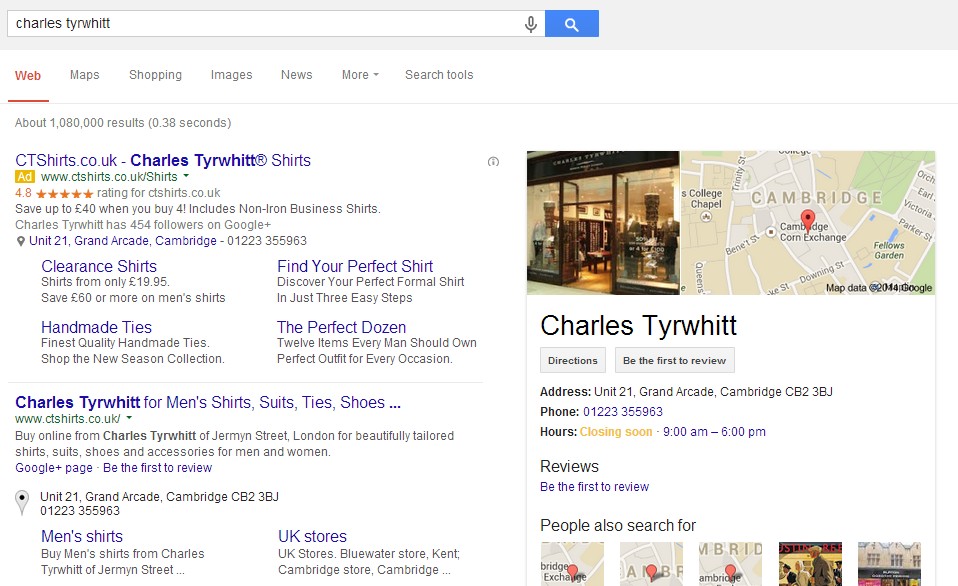PPC is a precise science. Getting the best from your campaigns comes down to fine margins – and sometimes it’s the tiny tweaks that help you steal an advantage in the SERPs turf war. But PPC needn’t always be so fiddly.
Bidding on your own brand name is a savvy strategy regardless of your position in the organic results. It is also quite easy to implement and promises compelling benefits. Rewards include more click-throughs, higher-quality leads and increased sales conversion. Brand name ads can even lift the performance of unrelated campaigns across your account.
Give us five minutes to explain.
What do we mean by bidding on your brand name?
Simple. Running a PPC campaign with your brand name as the keyword. At first the strategy may seem odd, particularly if you’re ranking well in the organic listings. Detractors often say that it’s a waste of money. Or that it will damage your organic traffic. Or that it’s an exercise in narcissism. Yet the benefits of bidding on your own brand name have been proven many times over.
6 reasons for bidding on brand terms
Your brand is the real deal. Prove it to your searchers.
If you already rank number one in the organic listings for your brand name, it may seem counterintuitive to run a paid campaign for the same term. But paid ads are a great way to enhance brand exposure, reassure searchers of your brand identity and encourage click-throughs to your website. Two listings at the top of the SERPs are better than one.

Most people interact with search results above the fold – rarely scrolling down the page. As such the top of the SERPs is prime real estate and you should own as much of it as possible. Paid ads will also push any negative information about your brand – such as poor customer reviews – down the page, making it less likely to be discovered by your target audience.
Stop competitors muscling in
It’s becoming common for wily brands to bid on their competitors’ brand terms to hijack their traffic. Failure to secure a paid ad on your brand name could lead to a situation where your plain old organic listing is preceded by a competitor’s eye-catching ad. It’s like inviting your rivals to pitch their products and services outside your flagship store or head office.
So do you sit back as your competitors try to divert people away from engaging with your brand? Or do you fetch a hulking great pitchfork and force them off your turf? Exactly. Bidding on your brand name reinstates you at the top of the pile, where you belong. Your quality score will see that you soon outrank your competitors on your brand name.

Organic listings limit your flexibility to express yourself in the SERPs. There is – after all – only so much you can do with meta tags. Paid ads give you a lot more control, allowing you to create specific messaging to grab user attention and encourage click-throughs.
Running a last-minute online sale? Push traffic to the relevant landing page. Opening a new store in Bristol? Make sure searchers in the Westcountry know about it. It sure beats trying to manipulate your meta tags and then waiting for weeks while Google indexes the changes.
Branded campaigns can boost the performance of your other ads
Given the high relevancy of branded terms, your branded campaigns will likely have the highest quality scores in your account (9 or 10). These will offset keywords with lower quality scores and ultimately bring up the average quality score of your entire account. And because quality score is impression weighted, the more search volume your brand has, the greater effect this will have across your campaigns.
Conversion is high and easy on the wallet
Brand terms are usually cheap to bid on due to the lack of competition and high quality scores (from website relevancy etc). Conversion rates are generally high too. The searcher is aware of your brand – and actively seeking you out. That promises quality traffic and pre-qualified leads that are further into your sales funnel than people who have found you after searching for something more generic.
It adds up to an extremely cost-effective PPC strategy, which is why lots of brands do it.


The proof in the pudding
Here are some figures that provide a more tangible idea of how branded campaigns could impact your search performance.
These numbers show the share of traffic from a selection of branded search queries.
EasyJet: 73.30% share – Organic, no PPC
Ryanair: – 76.08% share – Organic, no PPC
Just Eat: – 78.93% share – Organic, no PPC
Red Letter Days: 91.11% share – Organic & PPC
In the examples above, failure to bid on brand name in competitive search spaces cost an average of 16% of clicks. That could have a dramatic impact on search performance across an average month.
With paid search on:
- 120,000 total clicks
- 60,000 paid clicks
- 60,000 organic clicks
With paid search off:
- 100,800 total clicks
- 0 paid clicks
- 100,800 organic clicks
No paid search, no paid clicks. All but 16% (19,200 clicks) will come from organic instead. This 16% loss may not sound catastrophic, but consider the financial implications.
With paid search on:
- 60,000 x £0.11 (Avg. CPC) = £6,600 spent
With paid search off:
- 0 x £0.11 (Avg. CPC) = £0 spent
How to turn £6,600 into £71,040
Brand and brand generic clicks convert at 5%. So it’s reasonable to suggest that a loss of 19,200 clicks would cause a loss of 960 sales per month. An average order value of £74 would mean a financial loss of £71,040 per month. Or to put it another way, spending £6,600 on a branded PPC campaign could bring in an extra £71,040 per month. And that’s before you consider the impact of customer loyalty, the lifetime value of your customers and the long-term implications of losing customers to your competitors.
Let’s wrap up with a quick conclusion
Branded PPC campaigns make sense logically and financially. It shows you to be a reputable brand, encourages click-throughs, allows you to entice your audience with flexible messaging, brings you qualified leads and can stop your competitors stepping on your turf. Best of all it needn’t blow your budget.


